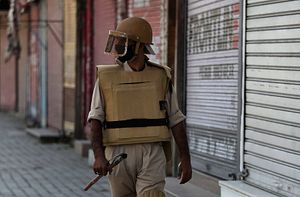In August 2019, when India’s Modi government formally ended Kashmir’s special status under the national constitution, it sold the decision with a package of promises. The hope was that, with legal and political integration, Kashmir would soon be able to attract investment from outside, create jobs for locals, and even right some old wrongs. On foreign policy, there was the chance that Modi’s bold decision might push New Delhi to build more meaningful and proactive strategic alliances, in order to defend its new interests.
Yet, six months on, these promises are getting harder to fulfil. With the internet in either complete or partial shutdown for the entire duration, and restricted movement around the Valley, business prospects have been limited. And while there was limited opposition in the early days from around the world, murmurs have since picked up, owing to the government’s internet shutdown and the detention of local politicians.
The latest salvo has come from the United States. Days before U.S. President Donald Trump’s visit to India, four top U.S. senators – including Trump’s close Republican ally South Carolina Senator Lindsey Graham – wrote a scathing letter to Secretary of State Mike Pompeo on “severe consequences” in Kashmir.
When the clampdown on restrictions began in Kashmir, Indian diplomats argued that all this pain would be temporary. But the bad news for New Delhi is that the stalemate keeps finding reasons to keep itself going. Internet services have come and gone on a whim: late on 12 February, mobile internet services were snapped again, owing to fears over the health of separatist leader Syed Ali Shah Geelani. They were restored hours later. Earlier this month, former Chief Ministers Omar Abdullah and Mehbooba Mufti were both detained under the draconian Public Safety Act (PSA) after months under restricted movement. Both leaders can now be held without any trial or charge for up to two years.
The challenge for New Delhi is to re-establish civic participation and normal governance in Kashmir, both of which seem increasingly impossible. With no clear allies or possible path out of the stalemate, the Modi government is setting itself up instead for a new normal: a valley full of suspected troublemakers, tightly held under the grip of security forces, with liberties afforded one day and taken away the next.
In taking a clandestine, no-discussions approach to its decision to revoke autonomy, New Delhi signalled early that it could not (or would not) trust any individual in Kashmir. By following that with a heavy clampdown and detaining the Valley’s most popular pro-India politicians, it further cut off the few available bridges for dialogue. The result has been alienation of pro-Indian locals. Worse, six months on, while the stalemate has worsened, the government has not yet identified any stakeholders in Kashmir whom it can trust and partner meaningfully. With nobody to work with on the ground, there is no way to resolve the fears which caused the shutdown in the first place – or to build public opinion in favour of India.
The one stakeholder group that is seen to be politically aligned with the government are the Kashmiri Pandits: Hindus from Kashmir who fled in the early 1990s in the face of targeted violence against them. For the past three decades, the Pandits have settled across India and the world, but with the constant demand to be resettled in their homeland. Following the revocation of autonomy, many Pandits hoped that there would be a pathway for them to return. Yet, in light of limited dialogue with locals who still live in Kashmir – and no political process with any of the stakeholders inside or outside Kashmir – even this increasingly seems like a pipe dream.
The path forward for the Modi government would be to re-engage with local politicians in Kashmir and resume dialogue with Kashmiri civil society, including debates and discussions over the future governance of the Valley. The legacy of the ongoing clampdown, however, will not be easy to overcome without sincere overtures and considerable statesmanship. Speaking to journalist Aatish Taseer last year, Mehbooba Mufti said, “We the people who had faith in the constitution of India have been proved wrong.”
When the Modi government revoked Kashmir’s autonomy, it hoped to introduce a new era of politics in the Valley. But with its unwillingness to engage with anybody on the ground, the government is now at risk of instituting a perennial dead-end.

































